Post by Mark Lavallee on Sept 21, 2012 10:01:28 GMT -5
And now we have entered the 80s, in a big way. Ian Anderson rang in the decade by jettisoning the entire classic lineup save Martin Barre. Anderson decided to release a solo album, Chrysalis records thought otherwise! What was supposed to be a solo album became Tull's debut album of the 80s, and gone was the earthy sound of previous years in favor of a very synthesizer heavy, modern sound, here we are with Jethro Tull's A.

Released on August 29th in the UK where it peaked at #25, slightly higher than the previous years Stormwatch. And on September 1st in the US where it stalled at #30, a full 8 spots lower than Stormwatch, ouch!
With bassist John Glasock passing away and drummer Barriemore Barlow quit the band after the loss of his friend. Anderson then shockingly fired keyboardists John Evans and David Palmer, whom he had worked with prior to Tull (Anderson was part of The John Evan Smash back in the mid 60's) and David Palmer had been involved with Tull from their debut on. These changes guaranteed that a change was inevitable, how drastic that change was came as quite the shock.

Anderson saw the changes as an opportunity to do something different and release a solo album. Enlisting the services of Martin Barre on guitar was a no-brainer, who better to interpret Anderson's songs? He retained bassist extraordinaire Dave Pegg of Fairport Convention fame who had filled in for the ailing John Glascock on the Stormwatch tour and in a surprising move collaborated with legendary keyboardist/violinist Eddie Jobson (Roxy Music, Zappa, Curved Air, King Crimson, UK, etc.) Rounding out the recording was American session drummer Mark Craney (Tommy Bolin, Jean-Luc Ponty, Gino Vannelli, etc.)
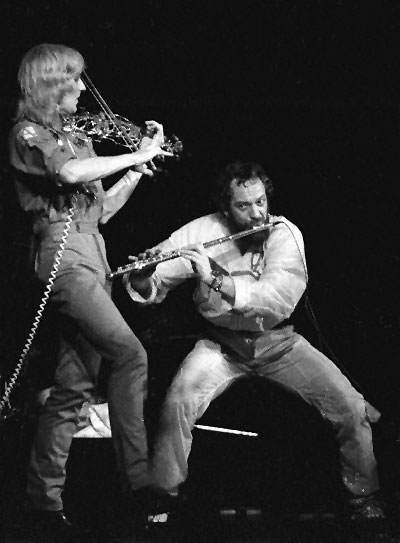
Chrysalis Records seeing Tull sales declining feared an Anderson solo album would be a big money loser so they forced him to release it as Jethro Tull, the album title comes from the fact the reels were labeled 'A' for Anderson. Anderson has always maintained the stylistic change was never intended for the band, but relenting to record company pressure meant this was the new Tull so Anderson retained the band and toured the album, radically reworking older material to fit the more modern sound. The songs are much poppier as a result, in other hands some of these tunes could have seen some serious airplay.
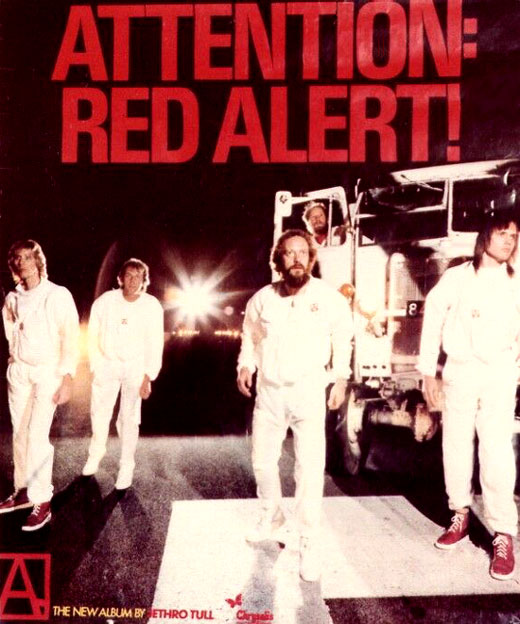
Side A opens with the topical Crossfire. Like Stormwatch the album is lyrically very modern and taken from current events. This song is no exception. It's subject is the siege of the Iranian embassy in London. Immediately the synth heavy sound hits you, this is a very different Tull. However, the song is a great brisk rocker with an incredibly catchy chorus and a wonderful solo from Martin Barre.
Next up is Flyingdale Flyer another one ripped from the headlines as the Americans had a hitch in their early warning systems at the Flyingdake Early Warning Station in Yorkshire and thought the Russians had provoked an attack. Musically it's a folky Tull song at heart, electrified. Electro-Folk, I don't know what to call it! Great effected vocal, very catchy melody in the verses and a great chorus. One of my favorites on the album. There's a very uh, dated video for this one too.
Next is Working John, Working Joe a biting critique of the Thatcher government. Deceptively begins acoustically before the synths hit you, a nice slow synthesized folk song, would have felt right at home on Stormwatch. This was, oddly, the single off the album, it's B side (Flyingdale Flyer) would have been more appropriate IMO.
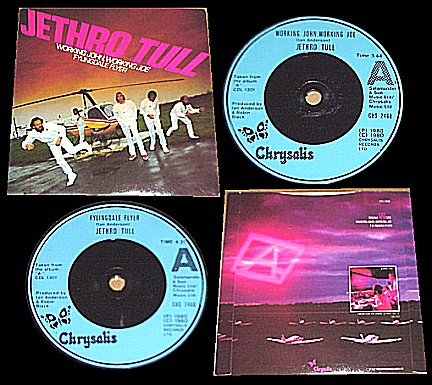
Side A concludes with the wonderful Black Sunday. Just a brilliant song all around, the interplay of the synths and flute is pure magic. The complex arrangement really shows off the entire band's considerable instrumental dexterity. The melody is incredibly catchy. A fun lyric full of imagery regarding work travel and how things can be quite different when you return home. A real Tull classic.
Side B opens with Protect And Survive, it's title comes from a government pamphlet on how to deal with a nuclear attack and lyrically it's Anderson's bitingly sarcastic take on it. A folk jig at heart, a very complex arrangement, short, sharp and really rocking. The true nature of this song showed on latter tours when the band would play it instrumentally Fairport style.

Up next is Batteries Not Included, a twisted tale of a boy waking up to find a new toy that doesn't work because the batteries weren't included, the boy identifies with the toy so much he becomes like it and his parents wake to find he's switched off as well. A spirited rocker with a very complex arrangement.
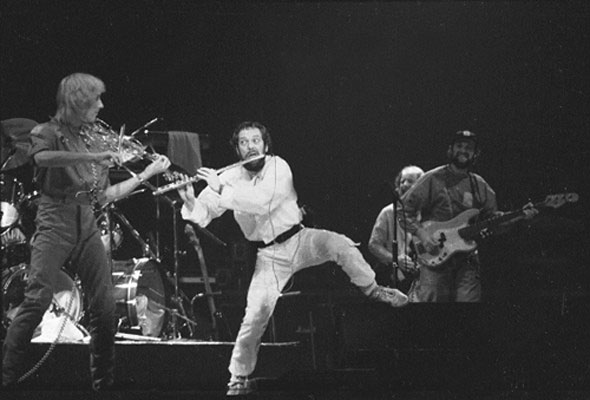
Uniform is next with a little eastern influence mixed in with some folk electrified. Nice melody here in this aong about how most people wear a "uniform" to fit in with their peers and lack of individuality. Not particularly memorable.
Next is 4.W.D. (Low Ratio), this is, uh, one of the worst Tull songs ever. Song is about four wheel drive vehicles, a decent jazzy swing to it harkening back to the very early days of the band but the song just does nothing.
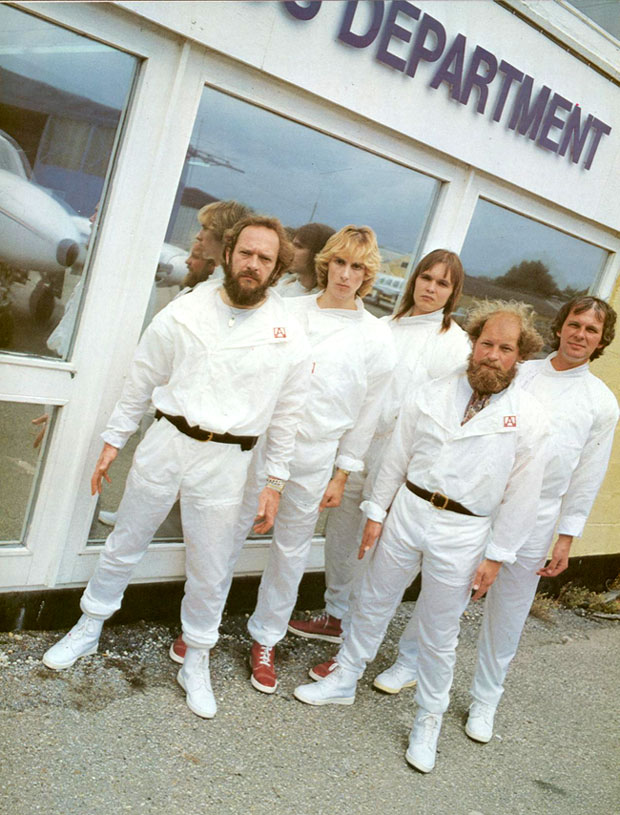
Up next is the great little instrumental The Pine Marten's Jig. A traditional folk jig played at breakneck pace with Eddie Jobson on violin and Ian's flute dominating. Barre lets loose all over this one as well, great stuff.
The album ends with the lush ballad And Further On. As delicate as it is powerful and a nice summary of the album's themes as a whole, lyrically dark and full of fear. A big favorite.
The remaster of the album has no bonus tracks, even better it comes with the long hard to aquire Slipstream video from 1981.

An hour long live document of the A tour with videos for Dun Ringill, Flyingdale Flyer, Sweet Dream and Too Old To Rock 'n' Roll mixed in. The live portion is wonderful, the band in those ridiculous white jumpsuits, Anderson his usual manic self. Jobson jumping all around, Dave Pegg and Martin Barre's effortless cool. Interesting seeing this band perform the older material, drummer Mark Craney on bass, Dave Pegg and Eddie Jobson on mandolin for Skating Away...
Or using the band member's individual strengths to his advantage such as Jobson's violin in Aqualung...
Or completely rearranging a s ong to fit the current incarnation of the band...
After the tour Jobson went off on his own, always billed as a "special guest" rather than a permanent member. Drummer Mark Craney moved on afterwards as well, his lifelong diabetes and kidney disease sidelined him for much of his life and he passed away while waiting for a kidney transplant in 2005.

All of this means the next Tull album would again be quite different...
Final thoughts:
A much stronger album than it's given credit for, Black Sunday alone is worth the price of admission, though it does slip on side B with several songs being filler at best, and one being outright terrible at worst. The addition of the Slipstream DVD with the album makes this a must own for your collection.
4.25 out of 5 stars

Released on August 29th in the UK where it peaked at #25, slightly higher than the previous years Stormwatch. And on September 1st in the US where it stalled at #30, a full 8 spots lower than Stormwatch, ouch!
With bassist John Glasock passing away and drummer Barriemore Barlow quit the band after the loss of his friend. Anderson then shockingly fired keyboardists John Evans and David Palmer, whom he had worked with prior to Tull (Anderson was part of The John Evan Smash back in the mid 60's) and David Palmer had been involved with Tull from their debut on. These changes guaranteed that a change was inevitable, how drastic that change was came as quite the shock.

Anderson saw the changes as an opportunity to do something different and release a solo album. Enlisting the services of Martin Barre on guitar was a no-brainer, who better to interpret Anderson's songs? He retained bassist extraordinaire Dave Pegg of Fairport Convention fame who had filled in for the ailing John Glascock on the Stormwatch tour and in a surprising move collaborated with legendary keyboardist/violinist Eddie Jobson (Roxy Music, Zappa, Curved Air, King Crimson, UK, etc.) Rounding out the recording was American session drummer Mark Craney (Tommy Bolin, Jean-Luc Ponty, Gino Vannelli, etc.)

Chrysalis Records seeing Tull sales declining feared an Anderson solo album would be a big money loser so they forced him to release it as Jethro Tull, the album title comes from the fact the reels were labeled 'A' for Anderson. Anderson has always maintained the stylistic change was never intended for the band, but relenting to record company pressure meant this was the new Tull so Anderson retained the band and toured the album, radically reworking older material to fit the more modern sound. The songs are much poppier as a result, in other hands some of these tunes could have seen some serious airplay.

Side A opens with the topical Crossfire. Like Stormwatch the album is lyrically very modern and taken from current events. This song is no exception. It's subject is the siege of the Iranian embassy in London. Immediately the synth heavy sound hits you, this is a very different Tull. However, the song is a great brisk rocker with an incredibly catchy chorus and a wonderful solo from Martin Barre.
Next up is Flyingdale Flyer another one ripped from the headlines as the Americans had a hitch in their early warning systems at the Flyingdake Early Warning Station in Yorkshire and thought the Russians had provoked an attack. Musically it's a folky Tull song at heart, electrified. Electro-Folk, I don't know what to call it! Great effected vocal, very catchy melody in the verses and a great chorus. One of my favorites on the album. There's a very uh, dated video for this one too.
Next is Working John, Working Joe a biting critique of the Thatcher government. Deceptively begins acoustically before the synths hit you, a nice slow synthesized folk song, would have felt right at home on Stormwatch. This was, oddly, the single off the album, it's B side (Flyingdale Flyer) would have been more appropriate IMO.

Side A concludes with the wonderful Black Sunday. Just a brilliant song all around, the interplay of the synths and flute is pure magic. The complex arrangement really shows off the entire band's considerable instrumental dexterity. The melody is incredibly catchy. A fun lyric full of imagery regarding work travel and how things can be quite different when you return home. A real Tull classic.
Side B opens with Protect And Survive, it's title comes from a government pamphlet on how to deal with a nuclear attack and lyrically it's Anderson's bitingly sarcastic take on it. A folk jig at heart, a very complex arrangement, short, sharp and really rocking. The true nature of this song showed on latter tours when the band would play it instrumentally Fairport style.

Up next is Batteries Not Included, a twisted tale of a boy waking up to find a new toy that doesn't work because the batteries weren't included, the boy identifies with the toy so much he becomes like it and his parents wake to find he's switched off as well. A spirited rocker with a very complex arrangement.

Uniform is next with a little eastern influence mixed in with some folk electrified. Nice melody here in this aong about how most people wear a "uniform" to fit in with their peers and lack of individuality. Not particularly memorable.
Next is 4.W.D. (Low Ratio), this is, uh, one of the worst Tull songs ever. Song is about four wheel drive vehicles, a decent jazzy swing to it harkening back to the very early days of the band but the song just does nothing.

Up next is the great little instrumental The Pine Marten's Jig. A traditional folk jig played at breakneck pace with Eddie Jobson on violin and Ian's flute dominating. Barre lets loose all over this one as well, great stuff.
The album ends with the lush ballad And Further On. As delicate as it is powerful and a nice summary of the album's themes as a whole, lyrically dark and full of fear. A big favorite.
The remaster of the album has no bonus tracks, even better it comes with the long hard to aquire Slipstream video from 1981.

An hour long live document of the A tour with videos for Dun Ringill, Flyingdale Flyer, Sweet Dream and Too Old To Rock 'n' Roll mixed in. The live portion is wonderful, the band in those ridiculous white jumpsuits, Anderson his usual manic self. Jobson jumping all around, Dave Pegg and Martin Barre's effortless cool. Interesting seeing this band perform the older material, drummer Mark Craney on bass, Dave Pegg and Eddie Jobson on mandolin for Skating Away...
Or using the band member's individual strengths to his advantage such as Jobson's violin in Aqualung...
Or completely rearranging a s ong to fit the current incarnation of the band...
After the tour Jobson went off on his own, always billed as a "special guest" rather than a permanent member. Drummer Mark Craney moved on afterwards as well, his lifelong diabetes and kidney disease sidelined him for much of his life and he passed away while waiting for a kidney transplant in 2005.

All of this means the next Tull album would again be quite different...
Final thoughts:
A much stronger album than it's given credit for, Black Sunday alone is worth the price of admission, though it does slip on side B with several songs being filler at best, and one being outright terrible at worst. The addition of the Slipstream DVD with the album makes this a must own for your collection.
4.25 out of 5 stars


